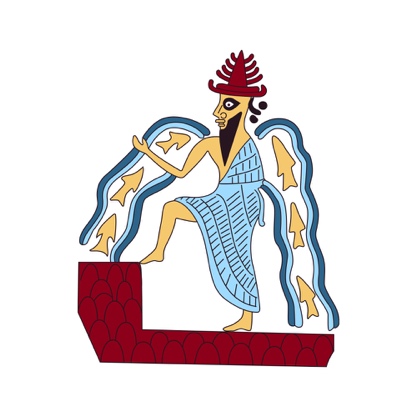
Enki was the Sumerian god of wisdom, fresh water, intelligence, mischief, healing, creation, fertility, and art. His intelligent magic often included trickery to benefit the good of the human race. Enki is portrayed as a loving and caring god who uses his wisdom to find the best solution in every situation. He was seen as compassionate in nature, with a desire to nurture humans.
Iconography depicts Enki as a bearded man wearing a horned cap and long robes as he ascends the Mountain of the Sunrise. The flowing streams of water running from his shoulders emphasizes his association with life-giving water, while trees representing the male and female principle stand in the background. Enki’s name means “Lord of the Earth” and his symbols are the fish and the goat, both representations of fertility.
Enki plays a major role in Babylonian myth, the Atrahasis, which is the Mesopotamian version of the Great Flood. In this myth, the elder gods made the younger gods do all the work on the earth. After digging the beds for the Tigris and Euphrates rivers, the young gods finally rebel. They sought a way out of the hard work. Enki suggests the immortals create something new, human beings, who will do the work instead of the gods.
The humans were then forged from the sacrifice of one of the younger gods. At first, they created only seven female and seven male humans, but due to their fertility, their numbers soon grew. At first the gods enjoy the leisure the human workers afford them but, in time, the people become too loud and disturb the gods’ rest. Enlil, the King of the gods, is especially annoyed by the constant disturbance from below and so decides to lessen the population by sending first a drought, then pestilence and then famine down upon the earth. His plans were continually undermined by Enki helping the humans.
Annoyed, Enlil decided to send a great flood to end humanity once and for all. Enki once again took pity on the humans and ensured that one man, Atrahasis, was made aware of the impending cataclysmic disaster. He relayed the message to Atrahasis, instructing him to build a boat. The boat had to house his family as well as two of every kind of animal. Atrahasis built the boat, and when the flood ensued, those aboard were the only humans to survive. Enlil found out it was once again Enki who came to the humans’ aid and sought vengeance on him. Enki convinced Enlil that the man he saved was a righteous man and didn’t deserve to be punished for the sins of his fellow humans. When Atrahasis offered a sacrifice to the gods, the gods were appeased.
Enki was especially symbolic to our founder, Dr. Albert Urmer (1929-2021), who had to flee persecution in Nazi Germany to the United States as a young child. Having experienced the sting of antisemitism early in life, Dr. Urmer traveled a path of kindness, compassion and service. Growing up in Missouri, he served his country in the Airforce as a young man. After his military service, he moved to Texas for graduate school. Once Dr. Urmer completed his doctorate in psychology, he moved to California to focus on mental health research, program consultation, and direct services in multiple counties in Central and Northern California, including developing the first psychiatric health facility in Cambria. In 1980 Dr. Urmer and his wife, Diane Urmer, gave form to the Enki myth by creating Enki Health Services, Inc. [originally known as Enki Health and Research Systems, Inc.]. His vision was to bring hope to the various Los Angeles communities that Enki serves. Like Enki the god, Dr. Urmer used his wisdom, intelligence, and compassion to nurture humanity through mental health services. Today we hold this story close to our hearts, continuing to follow his legacy of service with wisdom and compassion.

